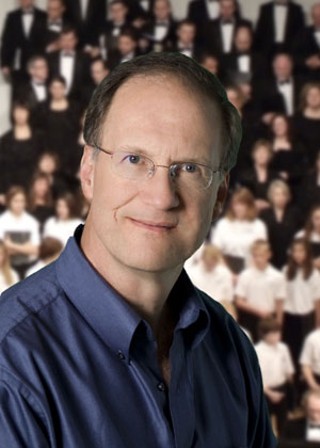'Renaissance & Response: Polyphony Then and Now'
Conspirare's choral riffs
By Robert Faires, Fri., Jan. 21, 2011

Four concerts with four different programs packed into three days? That's a crazy amount of music to master and present in such a short span, no matter what you're singing. Make that material as challenging as, say, the complex and not necessarily familiar choral works of the 15th through 18th centuries with a quartet of contemporary world premieres written in response to those works, and you have a series most choirs wouldn't even think of attempting.
Not, however, Conspirare. Austin's Grammy-nominated company of voices will be spending this weekend giving just such a choral tour of the Renaissance and the baroque era, and Robert Kyr, who penned the works premiering in Renaissance & Response: Polyphony Then and Now, believes you couldn't find a better ensemble for it. He considers Conspirare the finest chorus in the country and its artistic director, Craig Hella Johnson, "a genius ... [who] is moving the choral art forward in ways that very few, if any, other directors are." Kyr learned this firsthand when Conspirare performed his oratorio A Time for Life in 2009. And that experience confirmed for Johnson that the Oregon-based composer would be an ideal collaborator for this ambitious project.
"Craig came to me and said he wanted to do this festival, that it was a dream of his," says Kyr. "I said, 'That's always been my dream, too.' We were on the same wavelength, as we always are. Our taste in choral music is basically identical, which is very rare, because it's such a vast repertoire. We both have this love of the Renaissance in particular and baroque culminating in Bach. So when he said, 'I really want to do this, and I want you to be the composer because I want contemporary responses to this music that I love so much,' I said: 'As you know, that's at the heart of my own work. Those are the composers who have influenced me most.'"
The two quickly agreed on the series' four composers, each spotlighted in a separate concert. They are:
Josquin Des Prez (1450-1521) – The composer to whom Kyr feels closest and whom he's studied for 40 years, Kyr ranks him second only to Bach and calls him "kind of a rock star in his own era. He had that renown and popularity." The program Early Voices (Friday, 8pm) will present Josquin's music by candlelight. Kyr's Toward Dawn uses text from Psalm 130 to respond to Josquin's Nymphes des bois (Requiem), written in tribute to his late teacher Johannes Ockeghem.
Orlandus Lassus (1532-1594) – An incredibly prodigious composer, having written more than 2,000 works in every vocal genre and in several languages. "He was perhaps the most famous composer," says Kyr. "And he's considered one of the greatest technicians in the history of music. His counterpoint is flawless." The program Defining Mastery (Saturday, 4pm) includes pieces based on the biblical Songs of Songs; From the Abyss, Kyr's response to Lassus' Third Lamentation for Maundy Thursday; and Kyr's Santa Fe Vespers 2010, a response to Monteverdi's Vespers of 1610 composed last year.
Tomás Luis de Victoria (1548-1611) – The first composer of the Renaissance that Johnson came to love. "Emotionally, the music is so vivid," says Kyr, "and the polychoral pieces create this splendid sonic architecture that people really love." A Flowering in Spain (Saturday, 8pm) will feature Victoria's works for multiple choruses and Kyr's A Time for Song, written for soprano, baritone, and four choruses, based on texts from the Song of Songs and "Dark Night" by St. John of the Cross.
J.S. Bach (1685-1750) – "Bach is really beyond any composer," says Kyr, citing "the spiritual depth that's completely integrated with the technique. He's the consummation of this [musical form]. You can see everything coming to fruition, finally synthesized in this one master." And Then Came Bach (Sunday, 3pm) pulls together various Bach pieces in the manner of a cantata, alternating solo, duo, and choral movements. Kyr's response, Songs of the Soul, follows suit, drawing together the premieres from the first three concerts and connecting them with new solos and duets.
Kyr's responses, it should be noted, are not merely pastiches that copy period styles. While he's drawn inspiration from the works of the composers he loves, "there's no imitation whatsoever," he insists. "It's just my own way of living out these influences that are not only musical but deeply emotional for me, and spiritual. I'm writing in my own voice but with the emotional, spiritual, musical influence."
This celebration of polyphonic music wouldn't be happening, notes Kyr, without Johnson's boldness of vision: "He's fearless in terms of his programming and the way in which he presents the concerts. It's a kind of expansion of the choral art, taking a journey to places that can bring music into new life for the listener. He really creates a context in which everybody is welcome, and the musicmaking is of such depth and dimension that it really welcomes people into it."
Renaissance & Response: Polyphony Then and Now
Early Voices: Friday, Jan. 21, 8pm (preconcert talk: 7pm), sold out
Defining Mastery: Saturday, Jan. 22, 4pm (preconcert talk: 3pm)
A Flowering in Spain: Saturday, Jan. 22, 8pm (no preconcert talk)
And Then Came Bach: Sunday, Jan. 23, 3pm (preconcert talk: 2pm), sold out
All performances at St. Martin's Lutheran Church, 606 W. 15th. For more information, call 476-5775 or visit www.conspirare.org.










